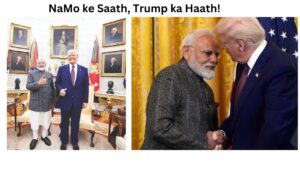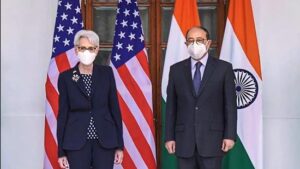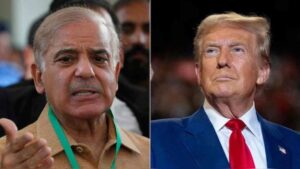US Tariffs Showdown:
Negotiations are a tricky thing, especially trade negotiations. Yes, you go in with a strategy, but it’s important to be flexible, to change your tactics based on the evolving situation. And that’s exactly what India is doing with the United States. Just think back to April 2nd. Most countries criticized Donald Trump’s tariffs, but India did not. Instead, New Delhi began talks. The strategy was to play along with Donald Trump, to strike a deal before anyone else. It looks like that strategy is now changing. Reports say India is toughening its position. It is demanding the removal of Trump’s 10% baseline tariffs.

Now, these tariffs apply to all imports. They have been retained despite some trade deals. For example, the US and the UK struck a deal last month. The US and the UK, they had a deal, yet the 10% tariffs still remain. But India is not deterred. India is pushing the Trump administration to scrap this baseline rate. Same with rules of origin. Donald Trump says 60% of a good value must be produced in India. Only then will it be seen as made in India. Again, New Delhi is pushing back. It wants to bring that down to 35%. India is also reportedly mulling tariffs on American imports.

Now, this relates to a different trade issue altogether. Back in March, you may remember, the U.S. imposed a 25 percent tariff on steel and aluminum. India moved the World Trade Organization, the WTO, against this tariff. As per rules, the WTO notified the U.S., Washington rejected that notice. They said the tariffs were triggered by national security. So, India is looking at responding. Reports say New Delhi could slap tariffs on U.S. almonds, walnuts, and metal, like a reciprocal tariff. Like I said, this is a different trade issue, but it confirms a change in tactics. The question is, what has triggered this? Well, the report talks about three main reasons.
Number one, Trump stepped back in court.
Last week, you may remember this, a New York court had stayed Donald Trump’s tariff.
The court said the president did not have such authority. He could not unilaterally impose tariffs. I’m sure that verdict influenced negotiation tactics. After all, why give concessions if the policy will be struck down? That’s one reason. Number two, the world has figured out TACO. TACO stands for Trump Always Chickens Out, T-A-C-O. The U.S. media has coined the term. It says the president inevitably makes a U-turn after raising the stakes. He chickens out. And we saw that with China. Trump raised the tariffs all the way to 245%, but eventually he backed down.
Again, this will influence negotiation tactics. And finally, reason number three, the political changes. Donald Trump is not exactly a favorite in India right now. In the middle of India’s operations in Pakistan, he announced a ceasefire. He also claimed credit for brokering the truce. India has repeatedly rejected Trump’s claims. He says the ceasefire was reached bilaterally between India and Pakistan. Nonetheless, Trump keeps repeating his claims and taking credit. So maybe India is losing patience.
And we see why. Pakistani officials are visiting the US this week. They’re looking to strike a trade deal with the US. Think about how absurd that is. Pakistan just sponsored a terror attack on India. They killed 26 innocent civilians in cold blood. And what does Donald Trump do? He rewards them with trade talks and deals. He calls their leaders great men. The question is, did that force India to recalibrate its strategy? I’m afraid we can’t be sure. But the fact is, Trump’s position is a lot weaker now. He’s facing setbacks in Ukraine. He’s facing setbacks in West Asia. He’s facing rejection in courts. So India would be wise to capitalize on the situation.
